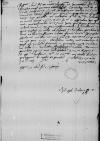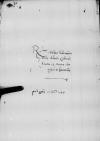Letter #1830
Ioannes DANTISCUS to Tiedemann GIESELöbau (Lubawa), 1538-01-14
English register:
Dantiscus has no fresh news, but he did not want the Provost [Paweł Płotowski] to leave without a letter. Johann von Werden has informed Dantiscus by letter that he will come to see him [in Löbau (Lubawa)] from Preußisch Mark (Przezmark); once Dantiscus has discussed the matter of the Scharpau (Szkarpawa) payment with Werden, he will send his brother Georg [von Höfen (Flachsbinder)] to Gdańsk (Danzig) to meet with the Dean [Leonard Niederhoff] on matters that he recently discussed in Heilsberg (Lidzbark Warmiński) with the addressee; after Georg’s return, Dantiscus will go back to Heilsberg.
| received 1538-01-17 Manuscript sources:
Prints:
| ||||||
Text & apparatus & commentary Plain text Text & commentary Text & apparatus Excerpts concerning Dantiscus' travels
Reverendissimo Domino
Reverendissime Domine, frater et amice carissime et honoran(de) or honoran(dissime)⌈honoran(de)honoran(de) or honoran(dissime)⌉.
Salutem fraternique amoris commendationem.
Tametsi nihil in praesenti scriptione dignum se offerat, nolui tamen sine meis venerabilem dominum
De novis penitus apud me nihil habetur. Quae in
Cui aetatem diutissime prosperam et opto, et precor.
Reverendissimae Dominationis Vestrae frater integerrimus


 BCz, 244, p. 4
BCz, 244, p. 4